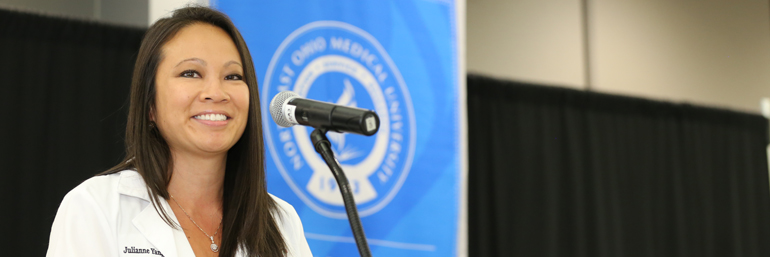Aug 2

Honored Residents Offer Advice
Recipients of NEOMED’s 2018 Excellence in Resident Teaching Awards were asked to reflect on the challenges and imperatives of providing humanistic care to patients. They left attendees of the Student Clinician’s Ceremony with some uplifting comments, excerpted below.
First, a little background: What is the Student Clinician’s Ceremony?
The national Gold Foundation—the parent organization of the Gold Humanism Honor Society—began the Student Clinician’s Ceremony to allay the anxiety that rising third-year students understandably feel as they head into clinical clerkships. After two weeks of preparation through the Prerequisite to the Clinical Curriculum course, students were ready to celebrate at a lunch ceremony Friday, July 27 at the NEOMED Education and Wellness Center Ballroom. College of Medicine faculty attended to cheer them on, with Dean Elisabeth Young, M.D., congratulating the students on their metamorphosis.
Gold Humanism Honor Society member Lillian Hetson led the event, which honored Daniel Wasdahl, M.D., associate professor of pathology, and Julie Aultman, Ph.D., director of the bioethics certificate program and professor of family and community medicine, with M2 Teacher of the Year Awards. Susan Nofziger, M.D., clinical associate professor of pediatrics and pediatric student clerkship director, was the keynote speaker.
Excellence in Resident Teaching Award recipient comments, paraphrased and edited for length:
I’m going to get real with you: Fake it till you make it. Residents don’t want to teach a wallflower. Ask questions. Be a thrill seeker. Be respectful. Stick together. If a patient is defensive, it’s because they have a back story.
—Julianne Yang, M.D. (’14), obstetrics and gynecology, Aultman Hospital, Canton, Ohio
When my uncle was hospitalized for Parkinson’s disease, he saw new faces in his room every day but one resident took extra time with him. My mother said, ‘’Remember to invest and engage in all you do and the rest will fall into place.’’ Today, compassionate care is the best part of what I do.
—Stefanie Delvecchio, M.D., family medicine, Summa Health Barberton (Ohio) Hospital
The challenge comes when you’re on your 15th patient of the day and the descriptions start to sound routine, whether it’s abdominal pain or chest pain or dizziness. If it disengages you from your patient’s it’s bad. You need to convey empathy. Try to elicit information by making statements to patients, instead of interrogating them. Try ‘’I’m curious about your day,’’ instead of ‘’How was your day?’’ –Daniel Hinds, D.O., emergency medicine, Mercy Health-St. Elizabeth Boardman (Ohio) Hospital
When you’re entering a patient’s room, try to humble yourself at the door. You’re not the most important person in the room. —Brandon Smith, M.D. (’17), general surgery, Summa Health, Akron, Ohio
“We teach not just by formal lectures and bedside rounds but by acting as role models in how to treat each other, ancillary staff, patients, and families. At times, these tasks may seem difficult or even impossible, like after a 24-hour shift or at 3 a.m. on a busy shift, but try always to remember the impact you have on medical students and strive to be that role model resident.’’
—Dylan Timberlake, M.D. (’15), pediatrics, Akron (Ohio) Children’s Hospital (not present; sent his remarks to be read)
Humility, intellectual curiosity, desire to maintain high standards of professional behavior: These are all qualities of those who overcome challenges to provide humanistic care.
—Kellen Welch, M.D. (’14), general surgery, Summa Health, Akron, Ohio


